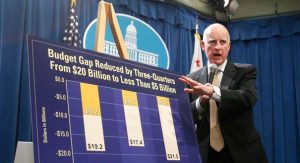Governor Brown Releases 2017-18 Proposed Budget
Sacramento, CA — Governor Jerry Brown has released a proposed $122.5-billion budget for the next fiscal year.
Brown was Thursday’s KVML “Newsmaker of the Day”.
The budget proposal sets the stage for negotiations with Assembly and Senate leaders over the next six months.
Mother Lode District Five Republican Assemblyman Frank Bigelow has issued a statement, reading, “I look forward to working with my colleagues in the Assembly and Senate to ensure that rural California’s voice is heard in the State Legislature’s upcoming budget negotiations. We must create new jobs and reignite California’s economy, but it starts with fixing our roads and making water storage a priority. My sleeves are rolled up and I’m ready to work.”
The Governor’s Office has released information regarding what Brown feels are the highlights: It is transcribed below:
Keeping the Budget Balanced
The budget proposes $3.2 billion in solutions to ensure a balanced budget. By tempering spending growth rather than cutting existing program levels, these actions minimize the negative effects on Californians. The solutions include adjusting Proposition 98 spending, recapturing unspent allocations from 2016 and constraining some projected spending growth. In total, General Fund spending remains flat compared to 2016-17.
Bolstering State Reserves
Proposition 2 establishes a constitutional goal of having 10 percent of tax revenues in the state’s Rainy Day Fund. With a $1.15 billion deposit in the budget, the Rainy Day Fund will total $7.9 billion by the end of 2017-18, 63 percent of the constitutional target. While a full Rainy Day Fund might not eliminate the need for further spending reductions in case of a recession or major federal policy changes, saving now would allow the state to soften the magnitude and length of necessary cuts.
Increasing Education Funding
K-14 funding is expected to grow to $73.5 billion in 2017-18, up 55 percent – or $26.2 billion – from 2011-12. For K-12 schools, funding levels will increase by about $3,900 per student in 2017-18, over 2011-12 levels. This reinvestment provides the opportunity to correct historical inequities in school district funding with continued implementation of the Local Control Funding Formula.
Continuing Health Care Expansion
Under the optional expansion provisions of the federal Affordable Care Act, the budget increases enrollment of this Medi-Cal population to 4.1 million Californians, with the state’s General Fund share of cost increasing from $888 million to nearly $1.6 billion.
Counteracting Poverty
California has an extensive safety net for the state’s residents who live in poverty. Since 2012, the General Fund has invested about $18 billion annually to help those in poverty. The budget continues to fund:
· The rising state minimum wage, which is scheduled to increase to $11 per hour in 2018 and $15 per hour over time.
· California’s Earned Income Tax Credit.
· The first cost-of-living adjustment for Supplemental Security Income/State Supplementary Payment recipients since 2005.
· The repeal of the maximum family grant rule in CalWORKs, which denied aid to children who were born while their parents were receiving aid.
· Increases in child care and early education provider rates and children served totaling $837 million.
Strengthening Transportation Infrastructure
Annual maintenance and repairs of California’s highways, roads and bridges are billions of dollars more than can be funded annually within existing revenues. The budget reflects the Governor’s transportation package, first proposed in September 2015, which would provide $4.2 billion annually to improve the maintenance of highways and local roads, expand public transit and strengthen critical trade routes.
Combating Climate Change
The state has appropriated $3.4 billion in cap-and-trade auction proceeds to help reduce greenhouse gas emissions, with funding prioritized in disadvantaged communities. With volatility in recent auctions due in part to uncertainty about the program’s post-2020 future, the Administration proposes two-thirds urgency legislation to confirm the program’s continued authority beyond 2020. Assuming approval, the budget proposes $2.2 billion in expenditures from auction proceeds, with a continued emphasis on low-income and disadvantaged communities.
The “Newsmaker of the Day” is heard every weekday morning at 6:45, 7:45 and 8:45 AM on AM 1450 and FM 102.7 KVML.

